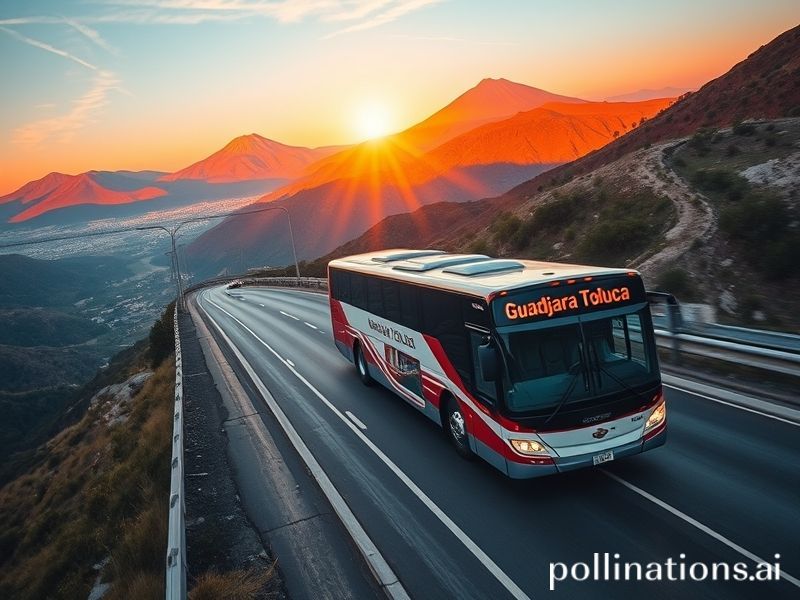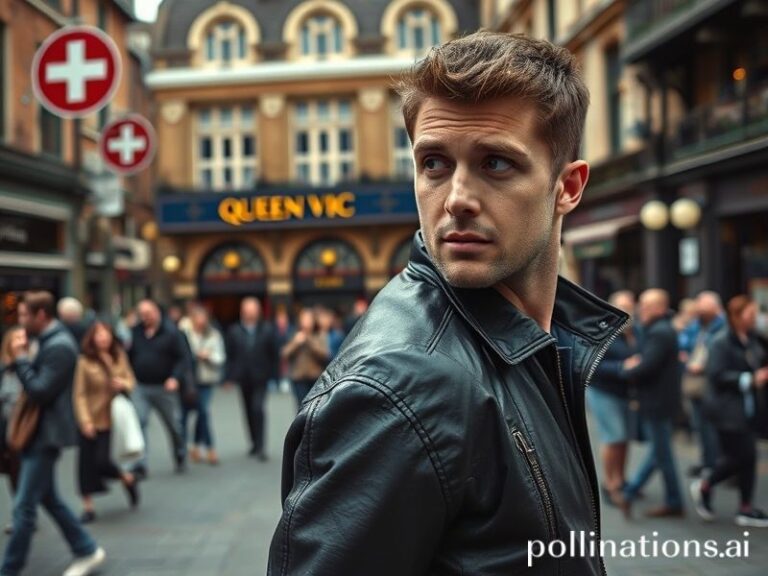From Mariachi to Megawatts: The Guadalajara-Toluca Corridor as the World’s Cynical Supply-Chain Snapshot
Guadalajara—Toluca: Two Mexican Cities and the World’s Slow-Motion Existential Crisis
If you spread a map of the globe across your kitchen table tonight, trace a careless thumb 460 kilometers west-to-east across Mexico’s midriff, and mutter “Guadalajara to Toluca,” you’ll notice something unsettling: you’ve just drawn the same line the planet draws when it wants to remind itself how simultaneously vibrant and doomed it is. One city births mariachi, tequila, and enough software engineers to staff a small moon colony. The other cradles the industrial lungs that keep Mexico City wheezing forward. Together, they form a corridor that feels like the world’s most photogenic shrug: progress and peril shoulder-to-shoulder, arguing over the check.
To the foreign investor scrolling Bloomberg on the Eurostar, the Guadalajara-Toluca axis is a tidy ESG slide: green tech clusters, aerospace maquiladoras, and a glossy new Tesla plant promising to turn lithium into virtue. To the drone pilot in Shenzhen tallying supply-chain risks, it’s a bottleneck of volcanic ash, narco roadblocks, and the occasional 6.2-magnitude reminder that Mother Earth has unpaid invoices. Somewhere between those two PowerPoints lies a truth both cities know in their bones: the 21st century is just a long-distance relationship with consequences.
Consider Guadalajara, Jalisco’s self-declared “Silicon Valley of Latin America.” Venture capitalists fly in from Sand Hill Road, marvel at the craft-cocktail scene, and tweet about “untapped talent pools.” They leave before sunset, partly to catch their red-eye, partly because the municipal water report reads like a Stephen King novella. The city’s digital wizards code fintech apps by day and ration bottled water by night—proof that you can disrupt anything except hydrology. Meanwhile, TikTok influencers in Dubai stream the city’s neon-lit tech district as aspirational content, blissfully unaware that every server farm is basically a kettledrum waiting for the next rolling blackout.
Slide east along the Carretera 15D and Toluca greets you with a colder altitude and the faint smell of burnt ambition. Once the sleepy capital of the State of Mexico, it now hosts sprawling pharmaceutical plants and a BMW facility that turns German spreadsheets into compact SUVs. Locals joke that the factory smokestacks are the city’s new cathedrals—except these spires emit carbon indulgences instead of incense. The airport, rebranded as “Felipe Ángeles Lite,” offers a low-cost alternative to Mexico City’s aquatically-challenged Texcoco lakebed. Its runways are so fog-kissed that pilots train for Himalayan landings; passengers disembark feeling oddly heroic, as if surviving the approach were a transferable life skill.
Between these two urban siblings, the global economy performs its favorite magic trick: extracting value while off-loading risk. Lithium mined in Sonora becomes Tesla batteries in Toluca; software designed in Guadalajara optimizes lithium extraction in Sonora—an Ouroboros with a supply-chain certification. The same week that the EU bans internal-combustion engines, Toluca’s assembly lines pivot to EVs; the same month that Netflix releases a documentary on water scarcity, Guadalajara’s tech parks install rooftop agave gardens as morale boosters. Somewhere in Davos, a panel applauds itself for “circular innovation,” blissfully unaware the circle is tightening around someone else’s neck.
And yet, for all the planetary portent, the journey itself remains stubbornly human. Bus drivers blast reggaetón at volumes scientifically proven to prevent existential dread. Tollbooth attendants hand out churros that taste like childhood and cholesterol. Roadside shrines to Santa Muerte flicker beneath LED billboards promising fiber-optic nirvana. It’s as if the universe, having read too much of its own apocalyptic fan-fiction, decided to add a laugh track.
So what does Guadalajara-Toluca tell the rest of us, beyond the obvious—that modernity is a high-speed chase with the hazard lights on? Perhaps that resilience now comes with a user agreement. Or that progress is less a straight line than a toll road with periodic narco checkpoints and the occasional volcanic speed bump. Either way, the corridor keeps humming, exporting dashboards, tequila, and existential data to a world too busy doom-scrolling to notice the scenery.
Drive it once, preferably at dusk when the smog turns the sunset a shade optimistic. Roll down the window, inhale the perfume of burnt rubber and mesquite, and admit the quiet, cynical truth: we’re all just cargo in someone else’s supply chain. Destination unknown. Seat belts optional.







